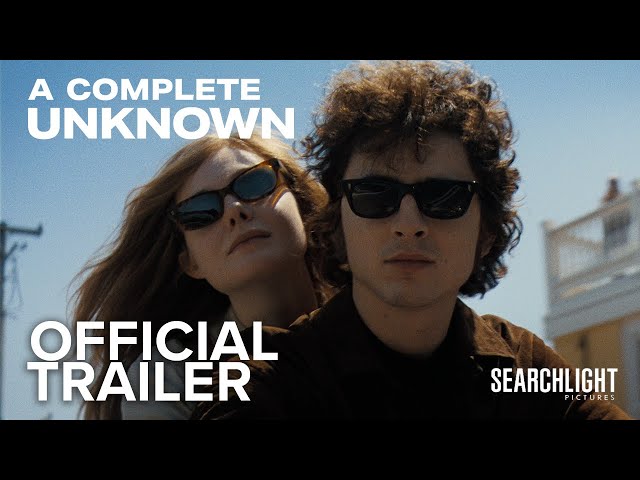There is a very reasonable criticism of A Complete Unknown I can’t really argue with. The film, starring Timothée Chalamet as a young Bob Dylan, is an incredibly traditional biopic about a highly specific point in a famous musician’s life. The movie hits so many familiar beats, and features so many other famous figures popping in and out, that at times it plays as a serious remake of Walk Hard: The Dewey Cox Story. At best some will say director James Mangold’s film lacks originality. At worst some will call it cliché. Both sides will be making the same point, and I can’t say they’re wrong.
I simply do not care about any of that. Because while it’s format might be familiar, A Complete Unknown is an absolutely beautiful film in every way. It’s full of fantastic performances and richly explored ideas, a gorgeous work of art about art, artists, celebrity, and self-expression that genuinely moved me from start to finish.
I went into A Complete Unknown almost entirely unencumbered by the burdens of history and expectations. I know Bob Dylan’s most famous songs and why he holds a special place in music history. And I also know about his controversial switch to playing electric, which serves as the climax of the film. While I’m old enough to understand why he’s a consequential, revered presence in pop culture, I am not old enough to remember him as anything but a living legend. Not only do I know almost nothing about his both career and him personally, I can’t even imagine Bob Dylan as a young man. To me he was born a 50-year-old enigma.
I knew even less about the other famous musicians who played such a prominent role during this period in Dylan’s life. I know who Pete Seeger was and the kind of music he played. Same with Joan Baez and Woody Guthrie. And that’s pretty much it. To me they were just artists without context. I didn’t know anything about their lives or who they were/are as people. (I only know about Johnny Cash because he already got the biopic treatment.)
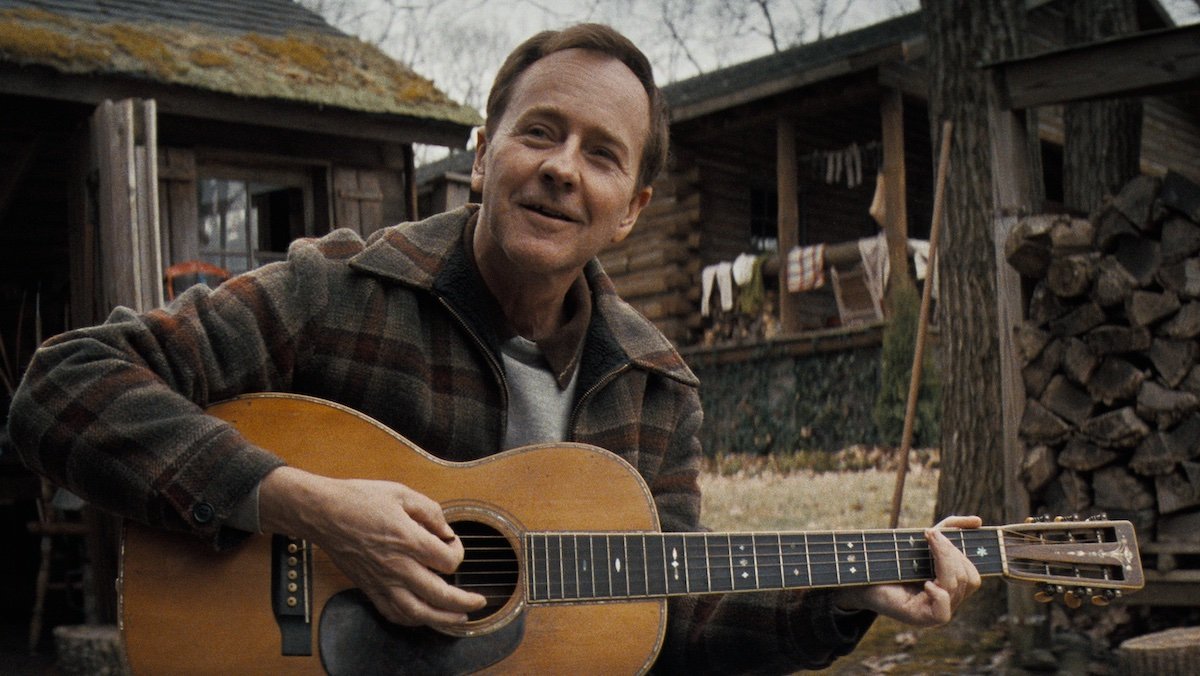
Normally none of that would matter for a movie review, but it does in this case because it’s important to understand A Complete Unknown might be totally full of shit and I’d have no idea. It might play very loose with history. It might even create events and personalities out of whole cloth for narrative convenience. If so that will be a huge problem for Dylan fans and music historians and another fair criticism I can’t argue with.
I simply do not care about any of that.
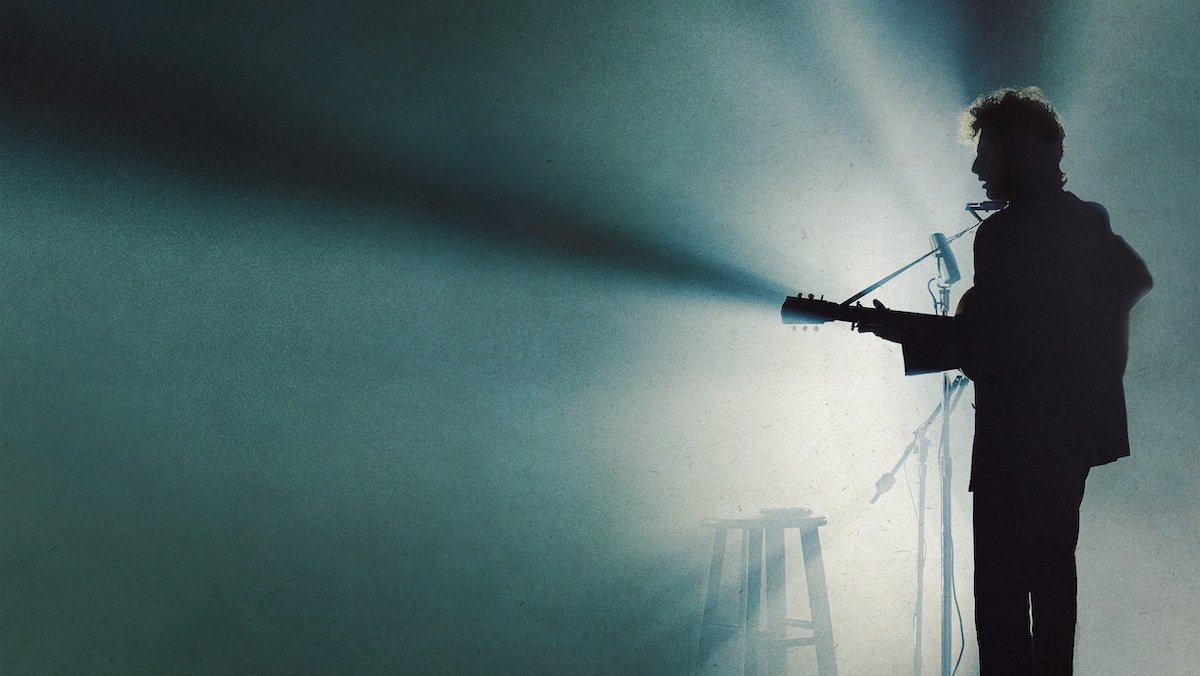
I went into this movie free of any ideas about how it would tell its story because I don’t know this story. I just know I walked out finding the story I was told tell incredibly effective.
A Complete Unknown is about the rarest type of artist, one who really deserved to be called a prodigy and a genius. The reason it works so well is that it understands something that would seem to undermine the film’s own existence: we can’t understand that kind of person or where their talent comes from. There is no way to make sense of someone who has natural gifts few could ever even try to learn. That frustrating truth is at the core of this movie. It’s the struggle those who knew and loved Bob Dylan face in A Complete Unknown. They’re desperate to connect with him—to make sense of him—but they can’t. And the harder they try the worse they feel. He’s always so far away even when he’s right there.
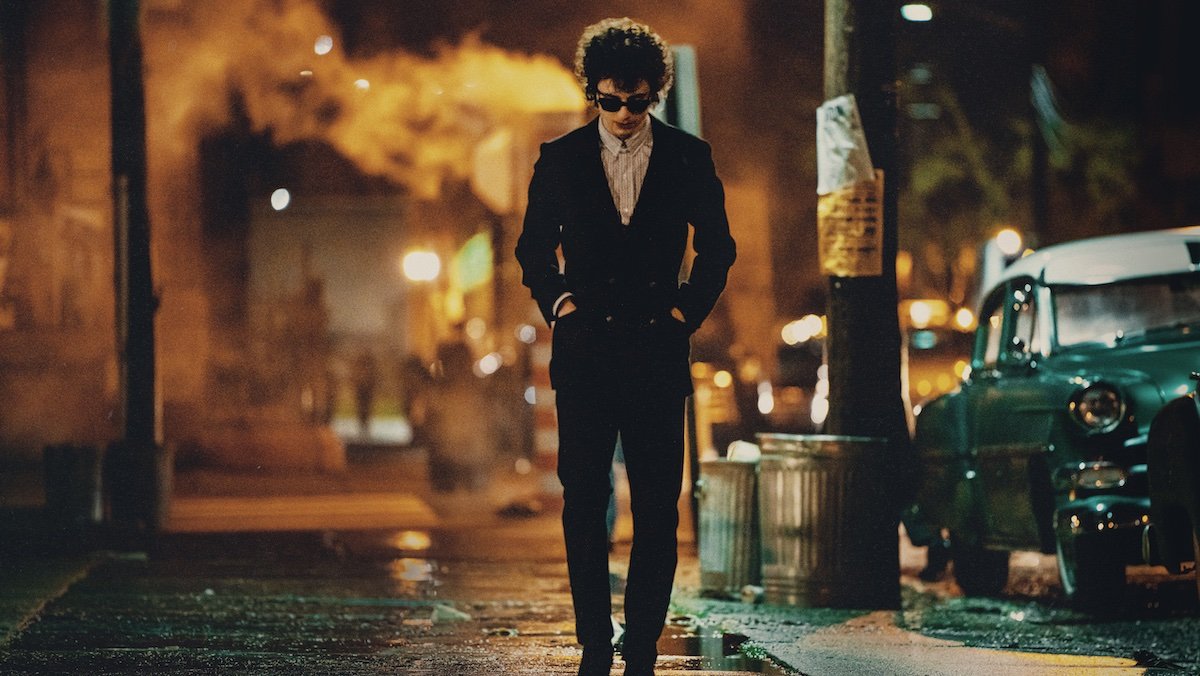
That’s why even though the film follows a well-trod format, that approach ends up being a strength. The movie is an inversion of a traditional biopic. They’re typically meant to help us understand who someone “really is” away from their art. Instead A Complete Unknown is about how such staggering genius is so unknowable and so unreachable by nature that not even the genius themself can full understand who they are. And in this case Dylan actively doesn’t care about letting anyone know anything about him because it doesn’t matter, only his music matters. Yet that’s all anyone in the film wants from him. They want to understand this man who leaves them awed by his art, either so they can learn from him or make him into what they want him to be.
A Complete Unknown doesn’t leave us entirely in the dark about him, though. (And not just because it shows why he was kind of an asshole.) What actually defines/explains Bob Dylan as a person is that all he really wants to do is write his songs and share them with others. That’s what drives him. The need to express himself—in a way few ever have or ever will—is almost a sickness. He leaves a beautiful woman’s bed in the middle of the night to strum his guitar and write world-changing lyrics with the ease of a child drawing random lines. And when he’s correctly called out for being an insensitive, annoying dick for doing that, he accepts that assessment. He knows that’s absolutely true, he just doesn’t care. He keeps writing because he simply must.
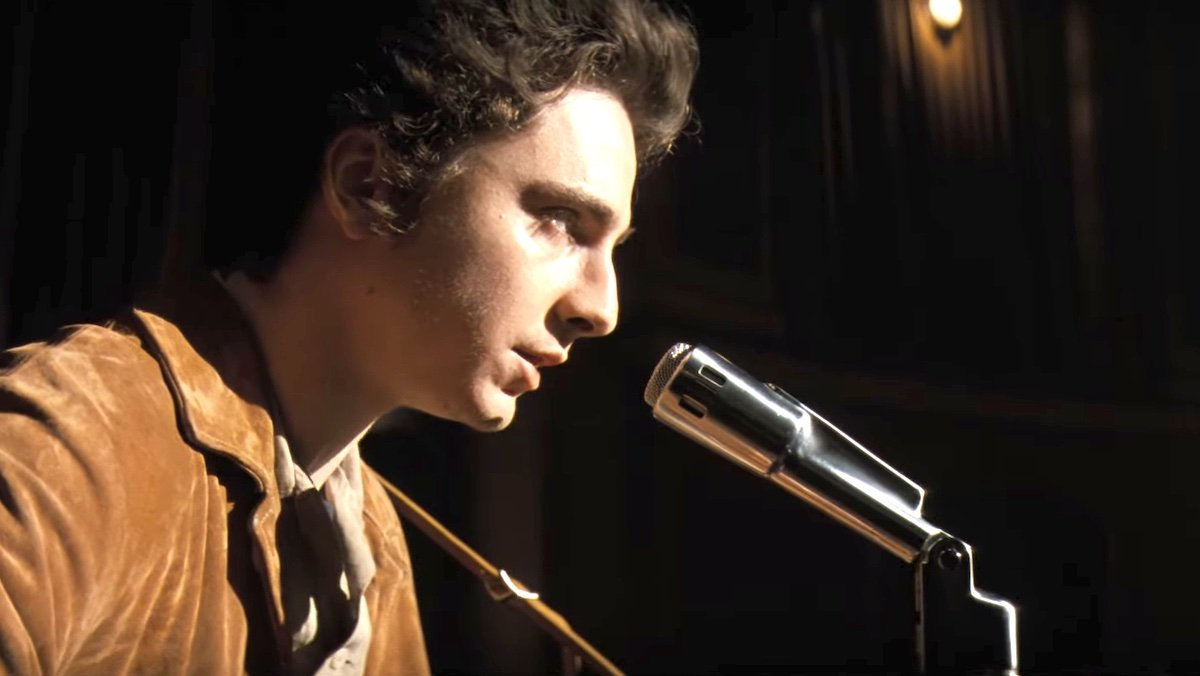
By the end of the film, I felt like I still knew almost nothing about Bob Dylan the person, yet totally understood him. Bob Dylan is/was/forever will be his music. He’s “a complete unknown” (a fantastic title itself layered with meaning) because he’s completely unknowable. In that way he’s both simple and complicated. He’s an artist so completely dedicated to his work, and sharing it with others, he sacrifices his own identity to do so. Once you understand that you understand him.
Want to know who Bob Dylan is? Listen to his music. That’s where you’ll find him, in his lyrics, in the notes he plays and how he plays them, in the way he sings and what he sings about and where. The other stuff like relationships, his past, basic decency, genuine human connection? Those don’t matter because to truly express ourself in a way that connects with others we must make sacrifices. They might not all be the same ones, and you don’t have to be a jerk to be a great artist. (Dylan is surrounded by plenty who aren’t.) But all great artists must make some kind of sacrifice, even if we don’t understand why.
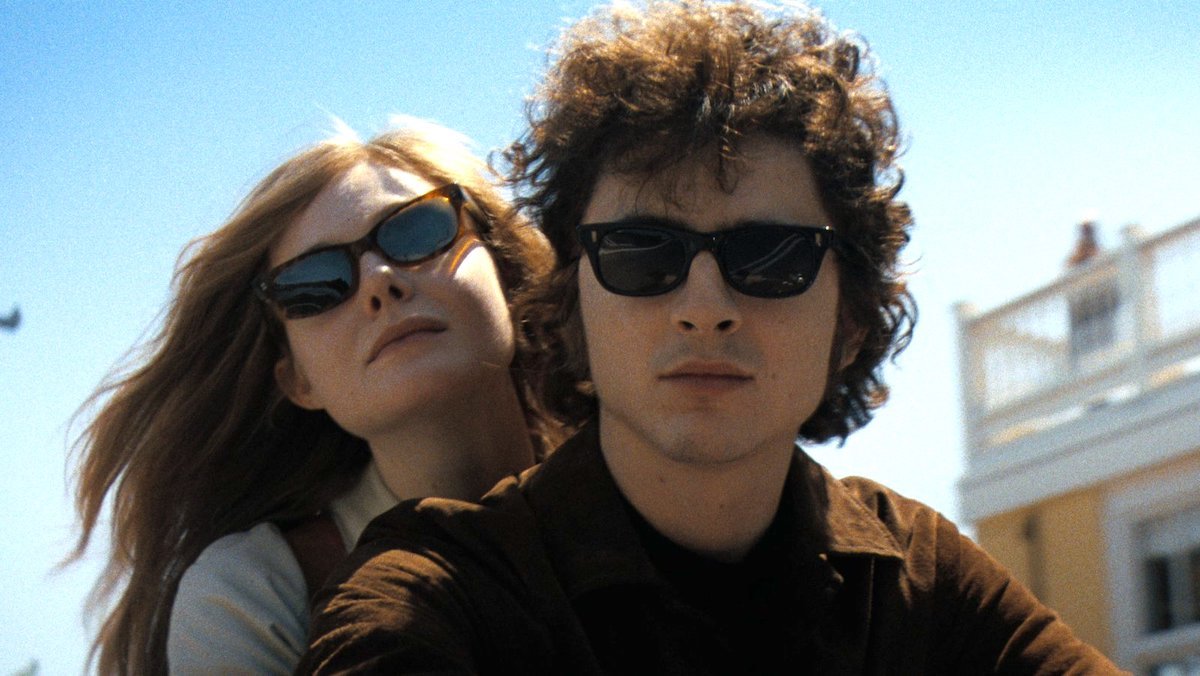
The greatest of those sacrifices in A Complete Unknown is the conundrum all famous artists face: celebrity. It’s one of the film’s best ideas, the double-edged sword that is sharing your art with the whole world. The more people you share yourself with via your work the more they want from you. The more they think they own a part of you. And the more they think they can define you and how you express yourself. This is the major internal conflict of Dylan’s story and it’s told with nuance and depth.
A Complete Unknown is able to so wonderfully explore its ideas about Dylan himself, art and the artist, celebrity and genius, passion, compulsion, and self-expression thanks to some beautiful filmmaking from Mangold, who shows a real grace and sophistication with this film. Even scenes that are very familiar because you’ve watched ones just like them a million other times are the best version you’ve ever seen. They’re beautifully lit and always feel intimate even when they’re at big venues.
Combined with the (surprise, surprise) incredible soundtrack that is young Bob Dylan’s catalogue, and the movie creates a tone and atmosphere that feels accessible yet elevated. It’s both a period piece and timeless, like a beautiful song in complete harmony with its surroundings. And even when some dialogue or sequences are a little clunky, trite, or overly grandiose it still works because the subject matter warrants such over-the-top proclamations. You can’t really oversell the music of Bob Dylan.
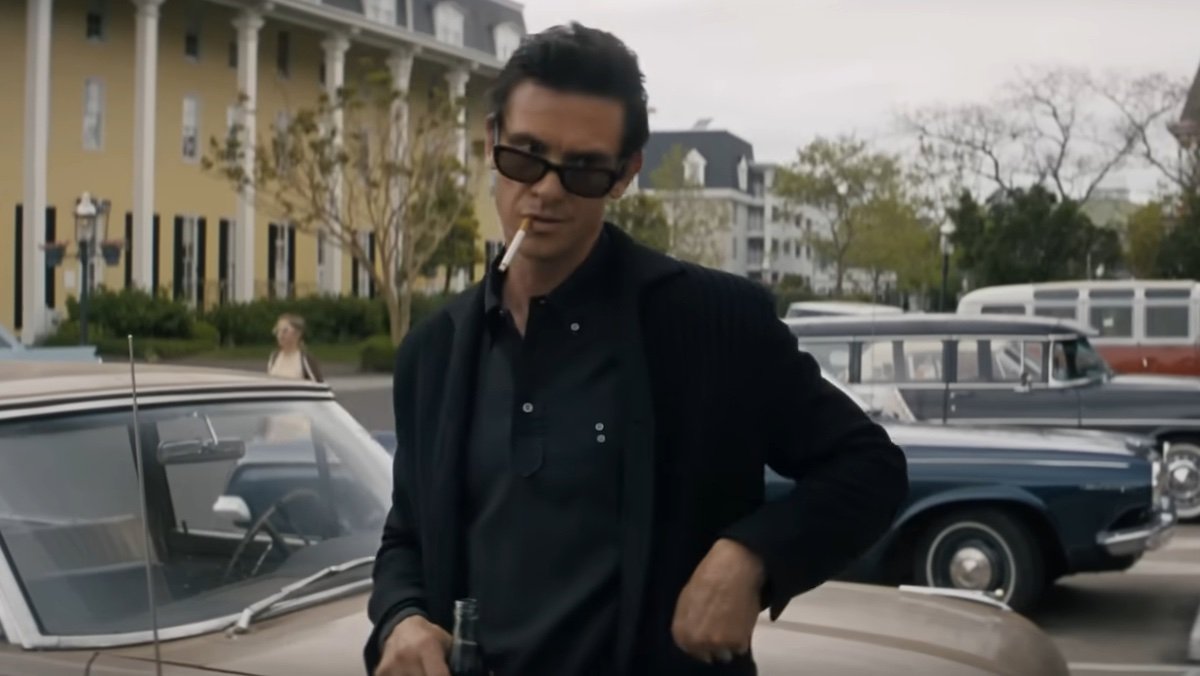
The film also works so well thanks to an incredible cast. Edward Norton is absolutely fantastic as Pete Seeger, a well-intentioned folk musician doomed to lose his fight with the inevitable tide of change. Without making you realize it, A Complete Unknown seamlessly tells a compelling story about Seeger that enhances its main story about Dylan. Monica Barbaro is also completely enchanting as legendary folk artist Joan Baez who gets caught up both personally and professionally in the storm of young Dylan’s rise.
Scoot McNairy also gives an inspired, mostly physical performance as Woody Guthrie. He’s only in a handful of scenes, but he plays the sick musician with a power and grace that makes his role feel so much bigger. The same is true of an unrecognizable Boyd Holbrook. He plays Johnny Cash, the one person who seems to understand Dylan’s need to express himself howeve rhe wants. Holbrook makes his mark in everyone of his scenes in a way that reminded me of Mark Wahlberg’s impact in The Departed. Holbrook only appears a few times but his presence is ten times that. Every time he comes on screen it’s like lightning hits.
Elle Fanning is initially hampered by an under-developed role as Dylan’s girlfriend and early muse Sylvie Russo. (She’s based on the very real Suze Rotolo). But in the latter half of the film she makes a huge impact. A Complete Unknown finally figures out why Sylvie is interesting unto herself. When it does Fanning gets to really shine in one of the film’s most emotional sequences. The only person the script totally fails is Dan Fogler. He plays Dylan’s manager Albert Grossman. Only it doesn’t matter because Fogler makes Grossman compelling anyway. He’s really cooking in a role that probably should have been swallowed up by everything else.
And, simply put, this is the best performance of Timothée Chalamet’s life. This was a really hard role for a whole lot of reasons. Dylan is not just incredibly famous and mysterious, he’s one of-a-kind and very recognizable. Young Bob Dylan’s hair and style are so iconic even a talented actor could easily come across like they’re doing a silly impression on SNL. But Chalamet gives a layered performance that is, fittingly, completely in-tune with Mangold’s vision and ideas. Chalamet also sounds great when singing and captures Dylan’s spirit. His portrayal totally works, one of the year’s best, and it makes everything else work.
Maybe A Complete Unknown is a complete crock. Maybe it’s a great collection of songs that gets Bob Dylan and his story totally wrong. I don’t know and I don’t care. If that’s what historians and experts tell me it won’t change how I feel about this movie. Instead of treating it as a biopic I’ll think of it as a beautiful work of fiction that says true things about art and the people who makes the very best of it.
Mikey Walsh is a staff writer at Nerdist. He wants to talk about the first time Dylan met Guthrie after you see the movie. You can follow Mikey on Bluesky at @burgermike. And also anywhere someone is ranking the Targaryen kings.

